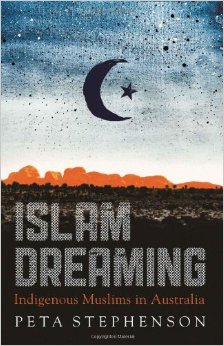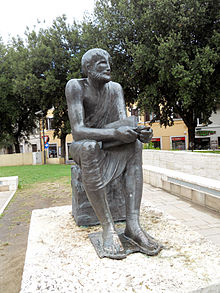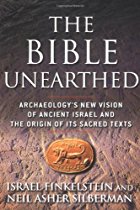It’s already got seven billion hits so most of you have probably already seen it, but for other latecomers like me . . .
Musings on biblical studies, politics, religion, ethics, human nature, tidbits from science
Distinct from Biblical Studies. Includes studies in origins and nature of religious ideas; posts on religions in history and contemporary world (e.g. Buddhism, Hinduism, Islam, Judaism.) Should this include post-biblical Christianity and rabbinical Judaism of late antiquity, the direct outgrowths of Second Temple era? Also includes various types of Christianity (e.g. fundamentalism) and debates with atheists. Posts on atheism and atheist world views per se are also included, of course. It does not include Islamism as the matrix of terrorism — that goes into Politics and Society. But here we get into a grey area. Compare social attitudes towards and criticisms of Islam related to Islamism and terrorism.

It’s already got seven billion hits so most of you have probably already seen it, but for other latecomers like me . . .


I was going to keep this a Christmas-free zone but the quiet here today is screaming at me to say something. I can understand atheists in Western countries who feel uncomfortable with Christmas. There it is closely tied up with religious associations.
The strength of these religious trappings varies, I am sure, with each cultural locale. There are many who can and do love Christmas without giving a thought to its religious origins.
While living in Asia I could not resist asking some Chinese whom I knew were either Buddhists or Taoists, if anything, why they were wearing Santa hats and wishing all and sundry Merry Christmas. Their answer: “It’s Christmas. Everyone loves Christmas.”
I even saw a Moslem girl happily wearing a Santa cap over her head-scarf.
But seeing Christmas being celebrated alongside the Chinese New Year alongside Deepavali alongside Hari Raya and a half dozen others it drove home to me that it just one of many social rituals that would have to be invented if it did not exist from time immemorial. Humans are social creatures and rituals are important to us as social creatures and that’s that. There’s always room for the odd individual to bow out for a time, shorter or longer.
The fact that it has religious associations probably has more to do with the centrality of religion in the lives of people than with the festival itself, if that makes sense.
Here are a couple of other views: Continue reading “Atheist Christmas”

Some call it “harmonization of the Gospels”, but it might also be described as a unique brand of theological historical method. That is, something that theological students do and call “history” so they can sound more like historians (a relatively relevant profession) instead of mere students of theology (a decidedly irrelevant one).
Here’s how it works.
One gospel describes a scene in order to illustrate a certain doctrinal teaching.
Another gospel, with a different doctrinal interest, describes a contrary scene to reflect another doctrine.
The historian (sorry, the theology student) enters and says: Ah, here the historical evidence appears to be contradictory. (Only “appears” contradictory, mind you. Aspiring theologians know that whatever can be seen is not of faith, and it is faith that is all important.)
So the (irrelevant) “theologian” who thinks he/she is a (relatively relevant) “historian” draws on their ecumenical leanings and finds a way to unify the two contradictory (oops, “apparently” contradictory) narratives.
This process is not a mere intellectual conceit. It is a necessary activity for those who need something consistent to believe in.
Here’s a case study to illustrate. It is from Tom Powers’ discussion of the ‘Alexander son of Simon’ ossuary. Continue reading “How the Faithful Destroy Biblical Stories to Stay Faithful (or the Ecumenical Method of Biblical Historiography)”

In following up why there has been a sudden strange peak of hits on my post about Adam’s rib really being a penis bone I find that the post was linked in the course of a creationist or ID discussion. However, the focus was not on the usual Christian fundamentalists, but on a Moslem scientist having articles arguing that the failure of geneticists to resurrect dead cells or create life proves that the Qur’an (why don’t we spell it Koran anymore?) is inspired by God or Allah.
The first post, the one worth reading, is Genomics is All Wrong. At least here in the post and additionally in the comments one learns what the actual arguments of geneticists are.
The second post (and the one including a link to my Adam’s rib post) is less savory in its tone (Wahid is Back).
I wonder what Christian fundamentalists think of Moslem fundamentalists using much the same pseudo-scientific arguments to prove their respective holy books.

 The will to believe is overpowering. And the idea of a single “God” as a real being who epitomizes all Goodness lies at the heart of religions that can trace their historic influences back to ancient Persian Zoroastrianism, or maybe only as recently as late Mediterranean paganism when the lesser deities of the Olympian pantheon were being subsumed as mere manifestations or angelic agents of the Supreme Deity.
The will to believe is overpowering. And the idea of a single “God” as a real being who epitomizes all Goodness lies at the heart of religions that can trace their historic influences back to ancient Persian Zoroastrianism, or maybe only as recently as late Mediterranean paganism when the lesser deities of the Olympian pantheon were being subsumed as mere manifestations or angelic agents of the Supreme Deity.
The efforts of modern believers to rationalize the God of their Book with pure Goodness are certainly quaint. A few of these were recently encapsulated in a theologian’s blog thus:
Many will say that the heart of the matter is whether God lied to humanity in the Bible. But that’s not the case at all. It is much easier to suggest that God accommodated the message in the Bible to what people could understand when it was written, or spoke in poetic rather than literal terms, or didn’t override the minds and understanding of the Bible’s authors when God inspired them, or perhaps didn’t even inspire the Bible at all, than to suggest that God lied and continues to lie to us through the evidence the universe itself provides. Continue reading “God: Liar? Compromiser? Poet? Incompetent?”

 I was lucky enough to catch the last ten minutes of Aborigines Choosing Islam, the latest program on Rachel Kohn’s The Spirit of Things. Like Malcolm X some aborigines are joining Islam initially in frustration and anger, but then finding a new identity and peace, lost their anger and dedicated themselves to a more spiritual life, becoming positive role models. Aborigines who convert to Islam bring facets of their own cultural heritage to it, hence the “Dreaming” in the title of the book by Dr Peta Stephenson, Islam Dreaming: Indigenous Muslims in Australia.
I was lucky enough to catch the last ten minutes of Aborigines Choosing Islam, the latest program on Rachel Kohn’s The Spirit of Things. Like Malcolm X some aborigines are joining Islam initially in frustration and anger, but then finding a new identity and peace, lost their anger and dedicated themselves to a more spiritual life, becoming positive role models. Aborigines who convert to Islam bring facets of their own cultural heritage to it, hence the “Dreaming” in the title of the book by Dr Peta Stephenson, Islam Dreaming: Indigenous Muslims in Australia.
But what’s a religion that does not also have its dark side? The tree of the knowledge of good and evil and all that. If one believes in a good man in the sky then why not a bad devil trying to rob him of his devotees? So the last couple of days bishops in the US have been following the Pope’s call for a return to traditional rituals and practices by holding a conference aimed at helping bishops become more exorcism savvy.
“What they’re trying to do in restoring exorcisms,” said Dr. Appleby, a longtime observer of the bishops, “is to strengthen and enhance what seems to be lost in the church, which is the sense that the church is not like any other institution. It is supernatural, and the key players in that are the hierarchy and the priests who can be given the faculties of exorcism.
 Of course it’s all very scientific nowadays. The bishops learn to diagnose who need a psychiatrist and who needs the crucifix. Also from The New York Times:
Of course it’s all very scientific nowadays. The bishops learn to diagnose who need a psychiatrist and who needs the crucifix. Also from The New York Times:
Some of the classic signs of possession by a demon, Bishop Paprocki said, include speaking in a language the person has never learned; extraordinary shows of strength; a sudden aversion to spiritual things like holy water or the name of God; and severe sleeplessness, lack of appetite and cutting, scratching and biting the skin.
Looks like Jesus made a mistake in exorcising the epileptic that regularly tossed the boy into life-endangering fits.

An article recently published in AlterNet:
The Family: Secretive Christian Group of Conservative Lawmakers Building a ‘God-Led’ Government
Jeff Sharlet, the journalist who helped expose a cohort of powerful lawmakers promoting a Christian Agenda at home and abroad, discusses his new book.
The Family, also known as the Fellowship, is a cohort of powerful lawmakers seeking to create a “God-led government” at home and abroad. Chief among the journalists who brought the Family to light is Jeff Sharlet, author of the new book, C Street: The Fundamentalist Threat to American Democracy. (The title of the book refers to the Washington townhouse that serves as the gathering place and sometime residence of Family members.)
[youtube=http://www.youtube.com/v/eaZE6uSa5vY&hl]

Last night I strolled along Serangoon Road in Little India, Singapore, to see what was happening in the build-up to the Hindu Deepavali festival. Some of the photos here are from Sri Veeramakaliamman Temple, others are from market displays. The last one listed here stood out as strangely “in place” as part of it all. (Clicking the images will enlarge them.)

Some of us might be interested in assisting with a survey for a project aimed eventually at publishing a book for those who have “deconverted” and embraced an atheistic/agnostic outlook on life.
Rick Dean who embraces an atheist/naturalist worldview after having been a “believer” himself has put up a questionairre on the net and explains its purpose:
Teologye.com is a research tool and will evolve as projects develop and/or are completed. I am currently researching and will be reporting on religious deconversions while focusing on the problems often faced by former believers during the process of “losing one’s faith”.
If, from an initial faith-based perspective, you have experienced a loss of faith or have reached the conclusion that the world around us was formed via natural processes instead of supernatural intervention I would very much like to hear from you.
The links are:
http://teologye.com/questionnaire
Continue reading “Questionnaire for fellow sceptics, agnostics and atheists”


This post completes a series on beliefs about demons that were widespread in philosophical thought at the time of the rise and early growth of Christianity. The previous two posts:
It seems strange to think of “demons” being a topic of “philosophy”, but one of the defining characteristics of “Middle Platonism” was its interest in religion. (See my earlier post, Middle Platonism: a few basics.) Other beliefs (e.g. Jewish sectarian) were extant, too, but here I am only addressing those of Middle Platonist philosophers.
John M. Dillon (The Middle Platonists) discusses the demonology of Apuleius in his De Deo Socratis (=The God of Socrates) at length because
There we find all the basic Middle Platonic doctrine on daemons set out . . . We have here, then, in the De Deo Socratis, the most complete connected version of Middle Platonic demonology extant . . . . (pp. 317, 320)
So though Apuleius was not born till about 123 CE, his writings are consistent with the thought that spanned the Middle Platonic era from the first century BCE to the second century CE, the same period relevant for the development of Christianity. Continue reading “Demonology: the basics of Middle Platonic beliefs as a background to early Christianity”

 In my previous post I cited a “Distinguished Scholar”‘s textbook summary of Middle Platonic ideas that formed part of the background to early Christianity. I continue this post with a discussion of the philosopher who introduced ‘demonology’ into Platonic philosophical views during the century preceding that of Paul and the earliest Christians.
In my previous post I cited a “Distinguished Scholar”‘s textbook summary of Middle Platonic ideas that formed part of the background to early Christianity. I continue this post with a discussion of the philosopher who introduced ‘demonology’ into Platonic philosophical views during the century preceding that of Paul and the earliest Christians.
In an earlier post I quoted translated passages from two Middle Platonist authors given prominence by Everett Ferguson, Philo and Plutarch, that depicted their particular views of cosmology and the place of demons in the universe. That post upset some readers who appeared to take exception to the posting of evidence from primary sources that lent support to the discussion of Earl Doherty in his publications arguing that the Jesus originated as a mythical construct. A significant part of Doherty’s discussion focuses on the way certain Middle Platonic views informed the intellectual background to the New Testament epistles.
Since that post I’ve had more time to look a little more closely at one of Earl Doherty’s sources, The Middle Platonists, by John M. Dillon. Continue reading “Demons 101 – Early Christianity’s Middle Platonic Background”

Well this is bizarre. I find myself in agreement with a very substantial bulk of a recent article by Jim West at The Bible and Interpretation, “A (Very, Very) Short History of Minimalism: From The Chronicler to the Present.” Jim West argues that biblical studies of the history of early Christianity are largely circular, following the same flawed methodology that lay at the heart of the Albrightian approach to the history of Israel.
Jim West sums up so much of what I have been attempting to argue for some time now:
Most “histories” of Ancient Israel and Earliest Christianity are simply examples of circular reasoning. Many historians use the Bible as a historical source; they reconstruct a history which is often nothing more than a recapitulation of the biblical telling; and the Bible is affirmed as historical because of the history so constructed. Similarly, the life of Jesus, for instance, is gleaned from a reading of the Gospels. Said reconstruction is named a ‘history of Jesus’ life.” That “history of Jesus’ life” is then utilized to prove historically the life of Jesus as described in the Gospels. One need only pick up John Bright’s “History of Israel” or Joseph Ratzinger’s “Jesus” to see circularity in action. True, ancillary materials are added to these histories (on the very rare occasions that they are available)- but these only reinforce the circularly circumscribed reconstruction.
What can I say? Will Crossley, McGrath and others tell Jim this is “bloody weird” stuff and arguing “like a creationist”? It’s what Thomas L. Thompson has said, and Robert M. Price, and I have quoted the same understanding in publications dating back a century to E. Schwartz and Albert Schweitzer. It is where biblical historians differ from nonbiblical historians.
So what’s the catch? Continue reading “The Refreshing Honesty of Jim West”

 Two archaeologists, one Israeli (Israel Finkelstein) and one American (Neil Asher Silberman), have bizarrely managed to repackage a Taliban-like ancient biblical legal code into a modern enlightened expression of human rights, human liberation and social equality.
Two archaeologists, one Israeli (Israel Finkelstein) and one American (Neil Asher Silberman), have bizarrely managed to repackage a Taliban-like ancient biblical legal code into a modern enlightened expression of human rights, human liberation and social equality.
Presumably this is done in order to preserve some (mythical) legitimacy for traditional claims among certain Jewish quarters that it is Jewish heritage that has been the harbinger of humanity’s modern spiritual values. One wonders if there is also a need to legitimize the claims of modern Jews to the land of Israel by appealing to a historic presence that must be justified in spiritual as well as mere ‘genetic’ terms.
The “Bible’s integrity”, they write, “stems from being a compelling and coherent narrative expression of the timeless themes of people’s liberation, continuing resistance to oppression, and quest for social equality. It eloquently expresses the deeply rooted sense of shared origins, experiences, and destiny that every human community needs in order to survive.” (The Bible Unearthed, p. 318)
Finkelstein and Silberman write this sort of stuff as a compensation for the fact that archaeology refutes many of the Biblical stories, such as those of the Patriarchs, the Exodus, the glorious united kingdom of David and Solomon. They console those who have long cherished such biblical myths as narratives of their genuine historical identity: “Yet the Bible’s integrity and, in fact, its historicity, do not depend on dutiful historical “proof” of any of its particular events or personalities, such as the parting of the Red Sea, the trumpet blasts that toppled the walls of Jericho, or David’s slaying of Goliath with a single shot of his sling.”
Indeed, Finkelstein and Silberman claim that the biblical narrative of the death of Josiah “set the pattern” for the even more enlightened Christian and rabbinic myths and values: Continue reading “More nonsense from biblical archaeologists: turning a Taliban text into a proclamation of human rights and dignity!”

Having been a Christian myself once or twice, it would be hypocritical of me to put down anyone for their religious beliefs. I have even posted a few nice-ish things recently and in the past about the relevance of religion for many people. But lest it be thought I’m going all marshmallowy on the topic, here are a couple of mundane tidbits that have recently come my way. It’s too easy to ridicule some things, so I really should just let them speak for themselves.
A few weeks ago I received this email from the developers of a new Christian website: Continue reading “Christian crock”